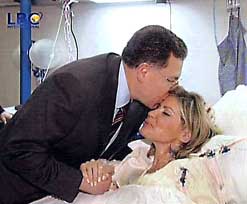 Below is the introduction to the Lebanese Blogosphere that I’m planning to post in the Global Voices website. Your feedback is much appreciated.
Below is the introduction to the Lebanese Blogosphere that I’m planning to post in the Global Voices website. Your feedback is much appreciated.Yesterday, Anton Efendi from
Across the Bay,
posted this picture:

It shows the Prime Minister planting a fatherly kiss on May Chidiac's forehead. May Chidiac is the Journalist who lost a foot and an arm in a terrorist car bomb.
To Anton, this kiss symbolizes the story of Lebanon: a country that throughout its history, survived by countering devastating acts of violence and adversity with great compassion.
The Lebanese have a strange relationship with their country. Most of them leave to find opportunity somewhere else, they complain constantly of its wrongs, they are very vocal of its shortcomings and have built a reputation worldwide for self-hate. Yet at the same time, they all harbor an unbridled sense of belonging, a sense of passion for their motherland, an optimism that one day, the sun of the land of the Cedars will rise again.
It is this paradox that defines what it truly means to be Lebanese, and it is in this context that we have to look at the Lebanese Blogosphere.
My name is Mustapha, and I'll be writing about the Lebanese side of the Blogosphere for the
Global Voices project. I'll try every week to summarize what various Lebanese Bloggers are writing, but today, please allow me to introduce you to a lovely bunch: The Lebanon Bloggers.
What makes someone a Lebanon blogger?
Some Lebanese only write about their personal lives, but deserve the title for the sheer fact of them being Lebanese. Take La La for instance, she
wrote yesterday about how upset she is that her best friend is devoting her entire time to her boyfriend. If La La didn't
occasionally mention her Lebanese heritage, you couldn't possibly tell from her blog that she's Lebanese. The same can be said of
Opinion From Bloggistan,
Levantese, or
The Suffragettes.
Some bloggers lay claim to the title not because they're Lebanese, but because they write about Lebanon. One example is Micheal Totten, an American who lives in and
writes about Lebanon. Another is Unfrozen-Caveman-Linguist (UCL), author of
Bliss Street Journal. UCL is also an American who lived for a while in Lebanon, but who still
blogs about it even after he left.
There are many Lebanon Bloggers out there, and thanks to the great effort of people like
Eve, Rampurple, Delirious, Liminal, Tempest, Maldolor, Ramzi and others, they can be found in
Lebanon Heart Blogs, a blog about the Lebanon bloggers.
But For the Purpose of the
Global Voices project, I found it useful to introduce the bloggers who post regular commentary about current affairs. I already mentioned Anton Efendi, who writes in
Across The Bay, a rather highbrow blog that sees current events as the manifestation of Machiavellian machinations of the political class.
Across The Bay has been around for a while, but a significant chunk of blogs came to light right after the colossal assassination of Rafic Hariri, Lebanon's previous Prime Minister, and the ensuing "Cedar Revolution". Those bloggers sometimes like to call themselves the March 14 bloggers, in reference to the day where the Lebanese from all sects and regions stood together to ask for
The Truth and for the Syrians to leave.
Raja and Doha from
The Lebanese Bloggers, Lebanon.profile from
Lebanese Political Journal, and Mustapha from
The Beirut Spring (yours truly), started their blogs right after the Hariri Assassination.
This is how
The Lebanese Bloggers explain the raison-d'etre of their blog:
This blog was created to honor the memory of heroes of all the Lebanese sects who were assassinated for their patriotic stands.... May God bless their souls and bless Lebanon.
Other bloggers immediately followed. While they don't see eye to eye on some issues, they write with obvious passion and strong wit. Kais author of
From Beirut To The Beltway, Carine from
Chercheuse D'or, Vox from
The Federal Republic of Lebanon (who also writes in
French), Lazarus from
Letters Apart, Ramzi from
Ramzi’s Blah Blah, Jose Wales from
Lebanonesque, Maya in her
space and
Abu Takla all have their distinctive personalities and styles.
Those and many more constitute the wonderful world of the Lebanon Bloggers. You will hopefully hear from them all soon.






































